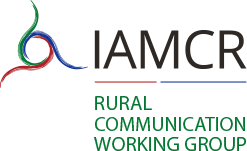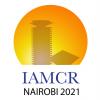 The working group aims to provide a platform for scholars and professionals working in the field of rural communication. The focus of the working group goes beyond the provision of services in rural areas and adopts a broad understanding of rural communication, ranging from the functioning of multi-stakeholder platforms, rural radio and other ICTs, agricultural extension services via farmer field school, SMS services and other channels to improving access to rural telecommunications infrastructures. Communication challenges to be addressed relate to the specific kind of communication and advisory services found in rural areas, the particular characteristics of rural communication infrastructures and the nature of the content and information relevant for rural people.
The working group aims to provide a platform for scholars and professionals working in the field of rural communication. The focus of the working group goes beyond the provision of services in rural areas and adopts a broad understanding of rural communication, ranging from the functioning of multi-stakeholder platforms, rural radio and other ICTs, agricultural extension services via farmer field school, SMS services and other channels to improving access to rural telecommunications infrastructures. Communication challenges to be addressed relate to the specific kind of communication and advisory services found in rural areas, the particular characteristics of rural communication infrastructures and the nature of the content and information relevant for rural people.
Topics include:
- innovative methodologies and new technologies for rural communication and extension;
- interdisciplinary multi-stakeholder actions and social learning;
- innovation system approaches and knowledge brokering;
- monitoring and evaluation for learning and institutional change;
- research and transdisciplinarity in rural communication for development theory and practice, and;
- mainstreaming communication in rural development policies.
The working group addresses the specifics of communication in rural areas. We focus on rural innovations and interventions, social change and development that responds in a sustained and inclusive manner to communication needs of rural populations. The working group operates in close cooperation with the Participatory Communication Research section as this section has historically provided a home for rural communication subjects, especially in the global South.
The working group was initiated by the Global Research Initiative for Rural Communication (GRI-RC), which seeks to mainstream communication for development into the wider development agenda and practice, and has been formed by the following institutions: The Centre for Communication and Social Change, The University of Queensland, Wageningen University & Research, Van Hall Larenstein University of Applied Sciences, University of Guelph, University of Reading, and University of the Philippines Los Baños. GRI-IC aims to collaborate in education and lead research into rural communication for development and social change and operates in partnership with the Food and Agriculture Organization of the United Nations (FAO).
GRI – RC strives to strengthen rural policy frameworks by incorporating and improving the communication processes and services involved. Although various scientists are working on technical innovations, sources and distribution, GRI-RC believes that communication is critical to addressing wicked problems that relate to agriculture and food, health and the environment in rural areas.
Co-chairs: Sarah Cardey [contact] and Rico Lie [contact]
See the list of all current members of the Rural Communication Working Group. For more information about a given member, go to https://iamcr.org/members-contact (accessible only to IAMCR members).
To join the Rural Communication Working Group (RUC), login to your account and select My Sections and Working Groups from the menu. A number of IAMCR sections and working groups send notices and other information exclusively to their members. IAMCR members can join up to three sections or working groups.

 The working group aims to provide a platform for scholars and professionals working in the field of rural communication. The focus of the working group goes beyond the provision of services in rural areas and adopts a broad understanding of rural communication, ranging from the functioning of multi-stakeholder platforms, rural radio and other ICTs, agricultural extension services via farmer field school, SMS services and other channels to improving access to rural telecommunications infrastructures. Communication challenges to be addressed relate to the specific kind of communication and advisory services found in rural areas, the particular characteristics of rural communication infrastructures and the nature of the content and information relevant for rural people.
The working group aims to provide a platform for scholars and professionals working in the field of rural communication. The focus of the working group goes beyond the provision of services in rural areas and adopts a broad understanding of rural communication, ranging from the functioning of multi-stakeholder platforms, rural radio and other ICTs, agricultural extension services via farmer field school, SMS services and other channels to improving access to rural telecommunications infrastructures. Communication challenges to be addressed relate to the specific kind of communication and advisory services found in rural areas, the particular characteristics of rural communication infrastructures and the nature of the content and information relevant for rural people.




